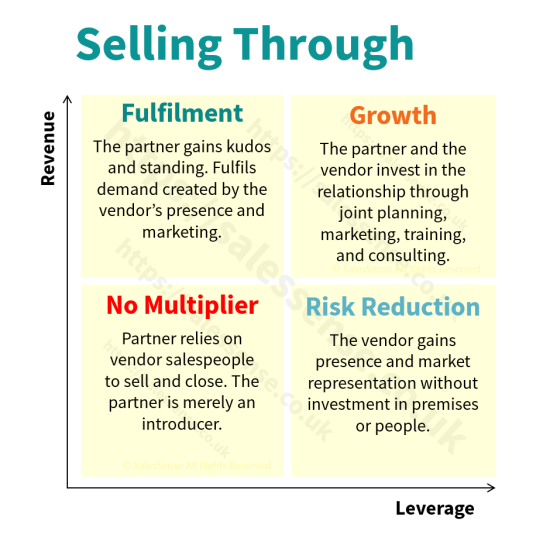Sales training for dealer, reseller, distributor, and alliance channel management.

Specialist sales channel management training for improving reseller, distributor, or alliance partner results.
What is the best channel management training?
- Based on researched best practices and channel account management experience.
- Upside down training - where the participants review the course content and then use the training session time to discuss, plan, practise and prepare changes.
- Involves the creation of workplace actions for embedding learning in participant routines and habits.
- The opportunity for one-to-one learning.
- Delivery by the course author.
- Guaranteed results.
Maintain or renew sales career momentum through training by doing. Participants take on workplace assignments in one-to-one or group workshops. Then reconvene to review results, adjust their approach, and take on their next assignment.
Training can be spread over several months, condensed into longer intensive sessions, or delivered over two consecutive days.
What are the key takeaways?
- Choose the right channel partners.
- Gain easy access to partner principals.
- Win partner loyalty.
- Increase partnership sales results.
What will participants learn?
Introduction: Goals, objectives, and learning management.
Differences: How selling through is different from selling to.
Qualification: Tools for choosing the right partners.
Understand Partner Issues: Perceiving the business from a Partner's perspective.
Trusted Advisor: How to know if you are one and how to become one if you are not.
Mentor: How to be considered a mentor by key partner staff.
Alignment: How to put yourself on their team.
Value Creation: How to be accepted as a management consultant.
Pipeline: Create a flow of new leads and customers.
Mind Share: Educate their staff.
Develop Partner Sales Skills: How to teach without being a trainer.
Business Collaboration: Establish a process of joint planning.
The Secret of Loyalty: How to become a strategic partner.
Review and Next Steps: How to transform learning into results.
Participant Comments
I enjoyed this training very much. It provided me with practical tools to improve my working behaviour and team and management skills as well as providing the opportunity to step back and refocus on my priorities.
A good insight into business relationships from many angles I haven't experienced - excellent!
Some really good exercises that can be used in my environment. Have a much greater understanding of certain issues now.
What is included?
- Self-study guide.
- Accelerated learning report.
- Accelerated learning micro-course.
- Course slide-decks.
- Partner qualification assessment.
- Partner qualification assessment presentation template.
- Shared goal development template.
- Strengths, weaknesses, opportunities, and threats assessment.
- Management consulting Boston chart templates.
- Partner plan template.
- Partner plan short form template.
- Persuasive questions report.
- The Power to Speak - e-book.
Channel Management Training Delivery Options
One-to-One
Take the course through twelve 1-hour or six 2-hour sessions with the course author.
£1295 Learn more.
One-to-one on a per-session basis.
£150 Learn more.
Virtual Classroom Group Training
Take the course through twelve 1-hour or six 2-hour sessions with the course author.
£4195 for up to fifteen people. Learn more.
Have key elements of the content presented session by session. Schedule each session to suit participant needs.
£450 per 1-hour session for up to fifteen people. Learn more.
Fees exclude applicable VAT.
Traditional Classroom
The programme is delivered over one or more days at a conference venue or the customer's offices. Contact us for fees.
What are the best channel account management practices for maximising business partner relationship success?
Effective management of business partner relationships, such as those with resellers and distributors, is essential for seamless operations and maximising business success. Here are the top practices for fostering successful partnerships, especially in the UK. Our channel sales training course provides the specifics of how to follow these principles:
1. Transparent Agreements
A solid foundation for any business partnership begins with clear and comprehensive contracts. These agreements should cover pricing structures, payment terms, delivery timelines, sales targets, marketing support, and termination clauses. The responsibilities of both the supplier and the partner should be detailed clearly, ensuring each party understands their obligations.
2. Regular Performance Reviews
To maintain alignment and transparency, establish a collaborative plan that sets out goals, activities, and roles. This should be separate from the formal contract to allow for flexibility and updates as needed.
Conduct formal reviews at least quarterly to discuss performance, reassess goals, and identify new opportunities. During these reviews, revisit the joint plan to track achievements and make necessary adjustments.
Regularly monitor KPIs and other performance metrics to evaluate partner success. Use these discussions to provide constructive feedback and identify areas for improvement, maintaining a productive relationship.
3. Aligning Business Objectives
For partnerships to thrive, they must meet the goals of both the supplier and the partner. Ensure that your offerings, marketing strategies, and promotional efforts align with your partner’s capabilities and objectives. Consistently communicate the value of this alignment and encourage feedback to help refine products and strategies.
4. Collaborative Marketing Efforts
Maximise the impact of marketing by ensuring partners fully utilise available support such as co-op marketing funds, marketing resources, and special programmes. Supplier-side managers may need to proactively guide partners to make full use of these resources, amplifying the benefits for both parties.
5. Clear Role Definitions
Defining the roles and responsibilities of both partners and suppliers is crucial for smooth cooperation. This is especially important for lead generation and follow-up activities. Document these roles in the joint plan to prevent overlaps and confusion. Clearly delineate territory, market, and account boundaries to avoid internal competition and maintain focus.
6. Comprehensive Support and Training
Provide thorough training to partner teams, ensuring they are familiar with the product’s features, benefits, and effective sales techniques. This training should be an ongoing process to keep partners informed and confident in representing the product. Ensure that partners do not become reliant on supplier account managers for selling; instead, empower partner sales teams to handle sales independently.
7. Building Trust and Encouraging Collaboration
Trust is built by fulfilling commitments, delivering as promised, and supporting partners’ success. Foster collaboration by involving partners in strategic discussions about market trends and future challenges. Recognising top-performing partners reinforces loyalty and motivation.
8. Conflict Resolution Protocols
Anticipate potential issues such as territory conflicts or subpar performance and have structured conflict resolution methods in place. Approach conflicts with a problem-solving attitude that focuses on preserving long-term partnerships rather than simply enforcing contract clauses.
9. Exclusive and Protected Relationships
Be cautious when offering exclusivity or protected market arrangements, as these can present legal challenges. UK competition law, enforced by the Competition and Markets Authority (CMA), prohibits anti-competitive practices to maintain a fair marketplace. Ensure any exclusivity agreements comply with relevant regulations to avoid legal complications.
10. Utilising Technology
Integrating technology into partner management can significantly improve efficiency. Contracts should require partners to report sales opportunities, aiding in accurate sales forecasting. Although partners may use different CRM systems, it should be possible to standardise data reporting for easy integration into the supplier’s CRM.
Other useful digital tools include online portals for sales enablement, product information, stock availability, and order management, streamlining operations for both parties.
Adopting these best practices allows businesses to build robust, mutually beneficial partnerships with resellers, distributors, and business partners. To further enhance partner management skills, enrol in our channel management training course.
Guarantee
We unconditionally guarantee the quality and effectiveness of our services. In addition, we warrant that the application of the principles, methods, and practices presented in our materials will lead to a gain in value equivalent to at least five times the fees. Should you decide that our services have not met this guarantee, we will refund your fees promptly and courteously.
Note: Quoted fees exclude UK VAT.
Want something different? Please ask:
If you are looking for channel management training or need to improve indirect sales through distributors, resellers, dealers, sales agents, or business alliances, we can help. Telephone +44 (0)1392 851500. Alternatively, use the contact form here or email custserv@salessense.co.uk.






















